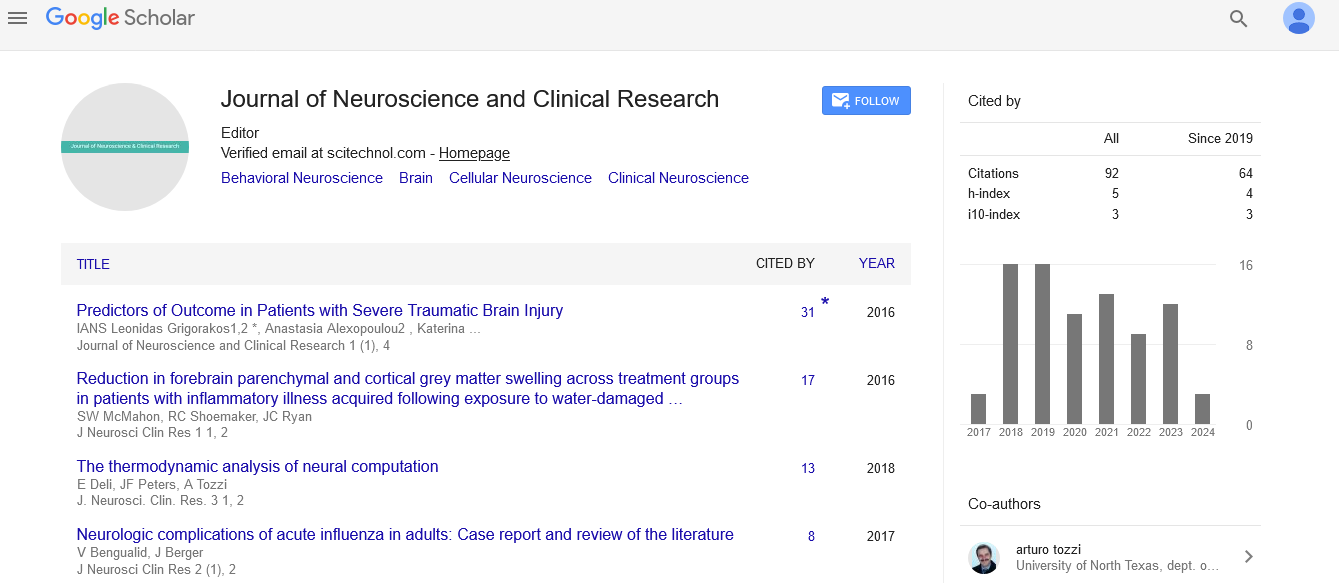Neurochemical characterization of insulin receptor expressing primary sensory neurons in the rat
Bence Andras Lazar, Gabor Jancso, Istvan Nagy and Peter Santha
University of Szeged, Hungary
Imperial College London, UK
: J Neurosci Clin Res
Abstract
Recent studies have revealed that insulin modulates the activation of the nociceptor specific, Transient Receptor Potential Vanilloid type 1 receptor (TRPV1) expressed on cultured rat Primary Sensory Neurons (PSNs). It has also been demonstrated that Insulin Receptor (InsR) shows colocalization with TRPV1 in PSNs of unidentified target innervation territories. The aim of our current study was to reveal the neurochemical properties of identified somato- and viscera-sensitive PSNs. In our first experiments, we assessed the localization of the InsR and its colocalization with the TRPV1 in spinal PSNs retrogradely labeled with biotin-conjugated Wheat Germ Agglutinin (bWGA) injected into the dorsal hind paw skin, the gastrocnemius muscle, the pancreas and the urinary bladder wall. We also analyzed InsR, TRPV1, substance P (SP) and Calcitonin Gene-Related Peptide (CGRP) immunoreactivities in retrogradely labeled pancreatic spinal and nodose ganglion neurons. We found that ~50% of visceral and ~20% of somatic PSNs showed InsRimmunopositivity. A major population of bWGA-labeled spinal and vagal PSNs exhibited TRPV1 immunoreactivity. Our results also showed that ~15% of somatic and ~30% of visceral spinal PSNs displayed InsR and TRPV1 colocalization. Additionally, colocalization of the InsR with SP or CGRP was demonstrated in 14% and 28% of pancreatic spinal and 24% and 8% of pancreatic vagal neurons. Our immunohistochemical data provide evidence for the colocalization of the InsR and the TRPV1 in somatic and visceral PSNs and demonstrate that a higher proportion of visceral PSNs express the InsR and display InsR-TRPV1 colocalization. Furthermore, our findings show that a relatively high proportion of pancreatic spinal and vagal PSNs display colocalization of the TRPV1, the InsR and sensory neuropeptides. We suggest that insulin may modulate TRPV1 activation and subsequent peptide release from visceral afferents and contribute to inflammatory and nociceptive mechanisms of the viscera.
Biography
Bence Andras Lazar is currently pursuing PhD in the Department of Physiology, University of Szeged and working as a Clinical Doctor in the Department of Psychiatry, University of Szeged. His current research fields include neuromorphology and addictology. Presently he is working with a Fellowship of the UNKP-17-3 New National Excellence Program of the Ministry of Human Capacities.
E-mail: b.a.lazar.md@gmail.com
 Spanish
Spanish  Chinese
Chinese  Russian
Russian  German
German  French
French  Japanese
Japanese  Portuguese
Portuguese  Hindi
Hindi 